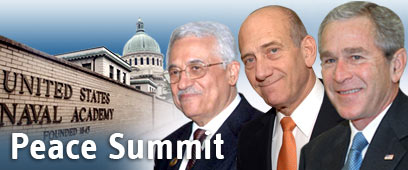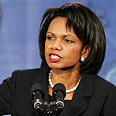


WASHINGTON – "I did not come here to argue whose cause is more just," said Foreign Affairs Minister Tzipi Livni to the audience of high-profile delegates in one of the last speeches delivered at the Annapolis peace conference.
"Our hands are extended in peace to the entire Arab world without exception," she continued, going on to ask Arab nations to relinquish the use of the 'Naqba' (The Disaster) in referring to Israel's birth.
Do not weep for the creation of Israel, she asked of the Palestinians, build your nation and Israel will join you in your joy for its establishment.
Meanwhile, the Syrian delegate in the talks, Deputy Foreign Minister Fayssal al-Mekdad told a closed session of the conference in Annapolis, attended by US Secretary of State Condoleezza Rice, that Israel should pull out of occupied land before Arab countries would normalize ties with the Jewish state.
"The establishment of normal ties with Israel ... must be the fruit of comprehensive peace and not precede it," he stated. "To phrase it clearly and decisively that this (normalization) comes after the total Israeli withdrawal from the 1967 Arab land," he said.
"We are sincere in seeking a comprehensive and just peace and posses the political will to achieve it."
'Children's right to live in peace'
Livni spoke of the "thousands of years" of history tying "my ancestors" to Israel and her personal belief to the Jewish people's right to the land – "now it is time to talk of another right – the right of our children to live in peace."
The foreign minister noted that the two-state solution was far from being a new idea and recalled the 60-year anniversary of the historic UN vote to partition then British-mandate Palestine into two nation-states.
Palestinian refugees, wherever they may be, she said, long for this nation-state just as all the Jewish refugees forced out of Europe and Arab countries longed for Israel.
Livni also urged Arab nations to step-up efforts to combat terrorism. "That should be the main focus of the world leadership in general and the Arab and Muslim world in particular. This is a decisive moment, a moment where we must all choose sides. And this is no longer about Arabs on one side and Jews on the other. In this one camp are all those who sit here today; Jews, Muslims and Christians, Israelis, Arabs, Americans and Europeans.
"Those who chose not to come here, those are the nations that support terror and radicalism; those who invoke God to sow hatred and send children to be killed."
Livni said that while Israel is interested in normalized relations with all Arab nations, it would not be forced into paying for recognition. "I have heard those who say that Israel must pay for normalization of ties with Arab states. That concept - where normalization is a prize of sorts, which has to be 'given' to Israel only after a comprehensive peace is achieved between it and its neighbors – that, gentlemen, is a mistake," she said.
"Israel's desire for peace with its various neighbors stems only from its desire for peace. As for normalization – that is something that would be beneficiary to both sides.
Rice: If it were not challenging, peace would have been made long ago
US Secretary of State Condoleezza Rice delivered the closing statement for the conference and thanked members of the Arab League for their attendance.
"I want to applaud those attendees at today's conference who shared their views seriously and soberly, not always agreeing, but seeking to build understanding through discussion and dialogue. In addition to
members of the Quartet, we also heard very important comments today from the Foreign Minister of Saudi Arabia, the current President of the Arab League.
"He reaffirmed the goal of the Arab League Peace Initiative, of reconciliation not only between Israelis and
Palestinians, but between Israel and the larger Arab world," said Rice.
"To be sure, the issues to be resolved between the parties are very challenging. If they were not, peace would have been made a long time ago. But difficult to resolve does not mean impossible to resolve, especially with constructive engagement from regional states and the international community that we witnessed here today."
Yitzhak Benhorin and Reuters contributed to this report















